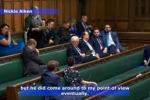Earlier today, Member of Parliament for the Cities of London & Westminster Nickie Aiken was selected to speak in the House as part of a debate marking the UN International Day of Education.
Unfortunately, the parliamentary time allotted for the debate ran out before Nickie was called to speak. Nickie has recorded the speech she would have given if time had allowed. You can watch the speech above or read a transcript of the speech below.
Yesterday, I attended the APPG for Global Education and heard from Selena, who lives in Kenya, tell her story as one of the first girls in her rural village to complete primary education.
Selena's powerful testimony also highlighted the devastating effect that the COVID-19 pandemic is having on developing countries. She told us of the increase in child marriage and pregnancy, and the fact that schools remain closed due to a lack of PPE, and with no prospect of online learning.
UNICEF reports that 463 million children across the world have been unable to access remote learning whilst their schools have been closed.
80% of children in Sub-Saharan Africa have no access to the internet at home.
The pandemic has clearly demonstrated that children in developing countries are both economically poorer but also technology deprived. I hope the international global technology and internet companies will work with governments, the UN, and NGOs to address this issue.
In my short time today, I would like to highlight an area that greatly concerns me and one we have seen raise its ugly head too many times over recent years, that of education being used as a target by extremists.
Just before Christmas, Nigeria's Government Science Secondary School was attacked by Boko Haram and 330 boys kidnapped and held for nearly a week.
In 2014, over 200 girls in Chibok in Nigeria were kidnapped by the same organisation, many forced into marriage and held for a number of years.
In Afghanistan under Taliban rule, girls were educated only to aged eight and many were forced into underground schools with teachers at threat of execution if discovered.
And, of course, the world is well aware of Malalia's experience of being targeted and nearly murdered by the Taliban for her campaign to secure education for girls.
With the UK set to co-host the Global Partnership for Education Replenishment summit this year and also host the G7, these are opportunities to lead the world on tackling the use of violence against education and encourage the global human rights sanction regulations to target the terrorist groups, like Boko Haram, that weaponise education.
The UK government is also well-placed to champion UN Resolution 1325 and encourage the use of more female peacekeepers and place safeguarding the ability of girls to access safe and secure education at the heart of operations in areas experiencing armed conflict.
Global Britain can take these opportunities to lead by example, to safeguard across the globe a girl's fundamental human right to education.
Thank you.






